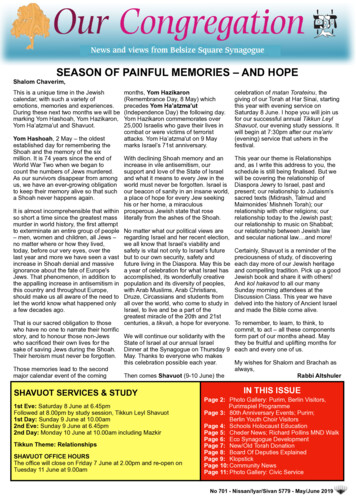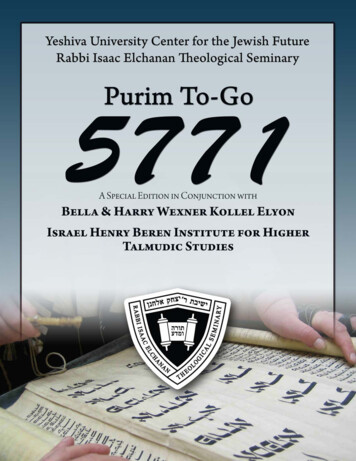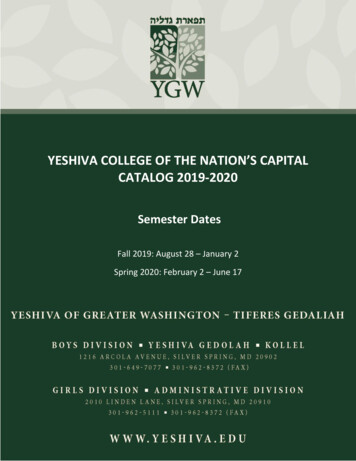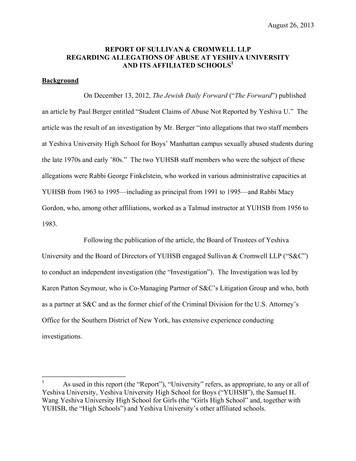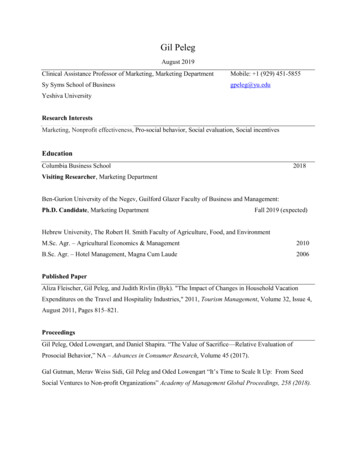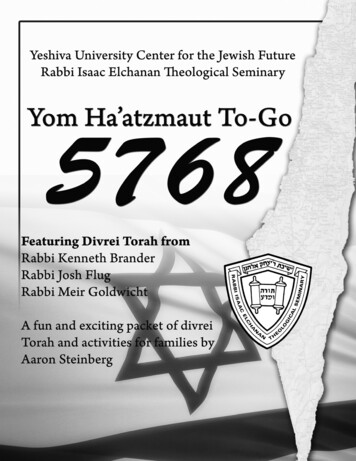
Transcription
1YESHIVA UNIVERSITY YOM HA’ATZMAUT TO-GO IYYAR 5768
Dear Friends,It is my sincere hope that the Torah found in this virtual ספר may serve to enhance your ( יום העצמאות Israel Independence Day) and your ( לימוד study).We have designed this project not only for the individual, studying alone, but perhaps evenmore for a ( חברותא a pair studying together) that wish to work through the study mattertogether, or a group engaged in facilitated study.With this material, we invite you to join our Beit Midrash, wherever you may be, להגדיל תורה ( ולהאדירה to enjoy the splendor of Torah) and to engage in discussing a matter that toucheson a most contemporary matter, and which is rooted in the timeless arguments of our greatsages from throughout the generations. בברכת חג שמח Rabbi Kenneth BranderRichard M Joel, President, Yeshiva UniversityRabbi Kenneth Brander, Dean, Center for the Jewish FutureRabbi Robert Shur, General EditorAaron Steinberg, Family Programming EditorCopyright 2008All rights reserved by Yeshiva UniversityYeshiva University Center for the Jewish Future500 West 185th Street, Suite 413, New York, NY 10033yutorah@yutorah.org 212.960.00412YESHIVA UNIVERSITY YOM HA’ATZMAUT TO-GO IYYAR 5768
Table of ContentsYom Haatzmaut 2008/5768Torah PerspectivesThe Mitzvah of Living in the Land of Israel: Isit a Biblical Commandment?Rabbi Kenneth BranderShould One Recite a Beracha on theRecitation of Hallel on Yom Ha'Atzma'ut?Rabbi Josh FlugIsrael: The Land of PerspectiveRabbi Meir GoldwichtFamily ActivitiesLetter from the EditorAaron SteinbergYom Ha’atzmaut Aliyah ProfilesUnderstanding HaTikvahPlan Your Dream Vacation in Israel3YESHIVA UNIVERSITY YOM HA’ATZMAUT TO-GO IYYAR 5768
The Mitzvah of Livingin the Land of Yisrael:Is it a BiblicalCommandment?Rabbi Kenneth BranderThis essay will briefly analyze the opinions of the Ramban (Nachmanides) and Rambam(Maimonides) as it relates to codifying living in the land of Israel as a Biblical commandment.The Opinion of RambanThe Ramban codifies as one of the Biblical commandments the Mitzvah to inherit and settle theland of Israel:The fourth mitzvah that we were commanded [is] to conquerthe land that God gave to Abraham, Isaac and Jacob, and notto abandon it to the hands of other nations or to emptiness.Ramban, Commentary on Maimonides’ Codificationof Biblical Precepts מצוה רביעית שנצטוינו לרשת הארץ אשר נתן האל יתברך ויתעלה לאבותינו לאברהם ליצחק וליעקב ולא נעזבה ביד . זולתינו מן האומות או לשממה השגות הרמב"ן לספר המצוות שכחת העשין The Ramban quotes the following verse as the source for this Mitzvah. ִישׁ ְבתֶּם בָּהּ כִּי ָלכֶם נָ ַתתִּי ַ ַשׁתֶּם אֶת הָאָרֶץ ו ְ וְהוֹר : ֶשׁת אֹתָהּ ֶ אֶת הָאָרֶץ ָלר And you shall dispossess of the land and dwell in it,because I have given you the land to possess it.Bamidbar 33:531 במדבר פרק לג פסוק נג The Ramban brings a number of additional proofs for his opinion.1See also Nachmanides’ commentary on this verse in the Torah4YESHIVA UNIVERSITY YOM HA’ATZMAUT TO-GO IYYAR 5768
A person should always live in Eretz Yisrael, even in a city thatis mostly inhabited by non-Jews, and not in the Diaspora, evenin a city that is mostly inhabited by Jews. For all those that livein Eretz Yisrael are as if they have a G-d, and all those that livein the Diaspora are as if they have no G-d. As it says (Vayikra25:38 ) ”[I took you out of Mitzrayim] to give you the land ofCna’an to be a G-d for you”. And anyone that lives in theDiaspora has no G-d? Rather, it means that anyone that livesin the Diaspora is as if he worships idols, and similarly byDavid it says (Shmuel I 26:19)” for they have driven me outthis day that I should not cleave unto the inheritance of G-d,saying: Go, serve other gods.” For who told David to worshipother gods? Rather, it means that anyone that lives in theDiaspora is as if he worships idols.Ketuvot 110b לעולם ידור אדם בא"י אפי' בעיר : ת"ר ואל ידור בחו"ל , שרובה עובדי כוכבים שכל הדר , ואפילו בעיר שרובה ישראל , דומה כמי שיש לו אלוה - בארץ ישראל דומה כמי שאין - וכל הדר בחוצה לארץ )ויקרא כ"ה( לתת לכם :' שנא , לו אלוה וכל , את ארץ כנען להיות לכם לאלהים שאינו דר בארץ אין לו אלוה? אלא לומר כאילו עובד עבודת - כל הדר בחו"ל : לך ' )שמואל א : כוכבים; וכן בדוד הוא אומר ' כ"ו( כי גרשוני היום מהסתפח בנחלת ה וכי מי , לאמר לך עבוד אלהים אחרים ? אמר לו לדוד לך עבוד אלהים אחרים כאילו - כל הדר בחו"ל : אלא לומר לך עובד עבודת כוכבים : מסכת כתובות דף קי The Ramban quotes a story from the Sifri, in which R’ Yehudah b. Beteira, R’ Mattiah b.Cheresh, R’ Chananiah b. Achi, R’ Yehoshua and R’ Natan were leaving Eretz Yisrael. At onepoint, they remembered Eretz Yisrael, raised their eyes, started crying and tore their clothes,quoting the verse And you shall dispossess of the land and dwell in it, because I have given you the land topossess it. They said that “living in Eretz Yisrael is comparable to the observance of all othermitzvot combine”.Additional proofs are brought from Ketubot 110b as well. The Talmud sates that if one spousewishes to move to Israel and the other does not, the one wishing to emigrate can demand adivorce of the other.Yet the Rambam in his Sefer haMitzvot does not count living in the land of Israel as one of the613 Biblical commandments. Why?The Objections of the Megilat EstherR. Isaac de Leon in his commentary, Megilat Esther, defends the Rambam for not codifyingliving in Israel as a mitzvah: In his defense of the Rambam, the Megilat Esther articulates thefollowing position:Position: The mitzvah of living in Eretz Yisrael was not given for all generations, rather it is aprecept limited to those generations living before the exiles and during the Messianic era. TheRambam has 14 principles guiding which precepts are included in the list of 613. The thirdpostulate is to only include commandments that are binding for all generations. Therefore itwould not be fitting to include this precept of living in the land of Israel as a Biblicalcommandment.5YESHIVA UNIVERSITY YOM HA’ATZMAUT TO-GO IYYAR 5768
The Megilat Esther brings a number of proofs to support the view that this is not acommandment for all generations:1. Tosafot on Ketuvot 110b (s.v. hu omer) writes that the Talmud’s statement permittingthe forcing of a spouse to move to Eretz Yisrael does not apply today because of thedanger of traveling to Israel. Tosafot continues with an additional reason, quotingRabbeinu Chaim [haKohen] that there is no longer a mitzvah to live in Eretz Yisraelsince we are unable to fulfill the mitzvot ha’teluyot ba’aretz (the agriculturally basedcommandments). It is for these reasons that the Rambam does not codify living in Israelas a mitzvah.2.For Rav Yehuda said: Anyone that goes up fromBavel to Eretz Yisrael violates a positivecommandment, as it says (Yirmeyahu 27:22)“They shall be carried to Bavel, and there shallthey be, until the day that I remember them”Ketuvot 110b כל העולה מבבל לארץ : דאמר רב יהודה ( )ירמיהו כ"ז : שנאמר , ישראל עובר בעשה בבלה יובאו ושמה יהיו עד יום פקדי אותם .' נאם ה : מסכת כתובות דף קי If living in the land of Israel is a binding Biblical commandment for all generations howis it possible for the prophet Yirmeyahu to articulate a perspective contrary to theTorah? This is another reason why the Rambam does not codify living in Israel as acommandment.3.What are these three oaths? One is that the Jewishpeople should not go up [to Eretz Yisrael] in force(on mass), one is that G-d made the Jewish peopleswear not to rebel against the nations of the world(to settle the land), and one that G-d made the othernations swear not to persecute the Jewish peoplemore than necessary.Ketuvot 111a שלא , ג' שבועות הללו למה? אחת שהשביע , יעלו ישראל בחומה; ואחת הקדוש ברוך הוא את ישראל שלא , ימרדו באומות העולם; ואחת שהשביע הקדוש ברוך הוא את העובדי כוכבים שלא ישתעבדו בהן בישראל . יותר מדאי . מסכת כתובות דף קיא From this statement in the Talmud it would seem that conquering and returning toIsrael en masse is forbidden. The Megilat Esther questions how then is it possible for theRamban to suggest that it is a Biblical commandment?4. R. Isaac de Leon continues to suggest that all the statements of Chazal describing theimportance of living in Eretz Yisrael are applicable in a time to when the Beit Hamikdashis functional. He also suggests the reason the rabbis cried and tore their clothes in theSifri as quoted by the Ramban, is because that after the destruction of the BeitHamikdash, they could no longer fulfill the mitzvah of living in Eretz Yisrael.6YESHIVA UNIVERSITY YOM HA’ATZMAUT TO-GO IYYAR 5768
Question: Let us evaluate the comments of R. Isaac de Leon in his commentary Megilat Esther.Do these arguments offer a valid rationale for the omission of the mitzvah of living in the land ofIsrael from the Rambam’s roster of biblical commandments?The Opinion in Tosafot of Rabbeinu ChaimThe use of Tosafot to suggest a reasoning for the Rambam’s omission of living in Israel in hiscodification of biblical commandments can be challenged in a number of ways.R. Joseph b. Moseh Trani in his Teshuvot Maharit (2:28) explains that there is a mistake in theopinion of Rabbeinu Chaim in Tosafot. Firstly, none of the codifiers of Jewish law among theRishonim (Rabbinic personalities from the 10th -15th century) quote this opinion. Additionally,Rabbeinu Chaim in his responsa, explains the reason the commandment is no longer relevant isdue to the dangers of travel not due to the inability to perform specific agriculturalcommandments. Further, the Mordechai (Ketuvot 313), the collector of the ideas of theTosafists, and the Shita Mekubetzet (Ketuvot 110b, s.v. hu omer) also quote the opinion ofRabbeinu Chaim as found in his responsa, and not the reason found in Tosafot.The Maharit continues, Rabbeinu Chaim’s comments about not being able to fulfill the mitzvotha’teluyot ba’aretz in our days is perplexing. He points out that one who wishes to fulfill thecommandments can purchase a plot of land in Eretz Yisrael and fulfill all the agriculturally basedcommandments. Therefore, Maharit suggests that the opinion of Rabbeinu Chaim as quoted inTosafot should not be relied as accurate and was the mistake of a student transcribing theopinion of his teacher.The opinion of Tosafot that there is danger in the travel might suspend for that time period theresponsibility to act upon the obligation of settling in the land, as danger suspends the majorityof mitzvot. However, such reasoning is not sufficient for explaining the lack of codification ofsettling in the land as a Biblical commandment.In R. Eisenstadt’s collection of responsa on laws found in the Shulchan Arukh (Pitchei Teshuvah,Even ha-Ezer 75:6) he describes an incident in which three families wish to move to Eretz Yisraelwith their families, and the Beit Din of their town wanted to prevent them from leaving because ofthe dangers of travel for the small children. However, it was determined that their plans could notbe impeded and that the comments of Rabbeinu Chaim and Tosafot were viewed as non-binding.Additionally we have clear evidence that in the early 1200’s several Tosafists made aliyah,ignoring the position mentioned in the Tosafot (used by the Megilat Esther as a reason for theRambam not including living in the land as a mitzvah). They include: R. Joseph of Clisson, RSamson of Sens, and R. Yonatan ha-Kohen of Lunel. Some even suggest that the number ofRabbis who emigrated to Israel at that time was close to 3002. Even the great codifier of Jewish2See Kanarfogel, Ephraim. “The Aliyah of ‘Three Hundred Rabbis’ in 1211:Tosafists Attitudes toward Settling inthe Land of Israel.” The Jewish Quarterly Review , vol. 76, no. 3, (Jan. 1986). pp. 191-215.7YESHIVA UNIVERSITY YOM HA’ATZMAUT TO-GO IYYAR 5768
law, the Tosafists R. Asher b. Jechiel, writes that the halakhah of forcing a spouse to move toEretz Yisrael applies at all times.Finally even if Rabbeinu Chaim’s opinion is correct, it cannot be used to substantiate theposition of the Rambam. For the Rambam, like the Rosh, clearly argues on Tosafot, as hecodifies unconditionally (Hilchot Ishut 13:20) that a man may force his wife to move to EretzYisrael, and vice versa. Therefore this proof of the Megilat Esther can not be used to validate theposition of the Rambam of not counting the mitzvah of living in Israel as a Biblical precept.The Prohibition of Moving from Bavel to IsraelR. Isaac de Leon claims that one observes from R. Yehuda’s position in the Talmud thatYirmeyahu established a decree against moving from Bavel to Eretz Yisrael. Therefore it must bethat the mitzva to live in Eretz Yisrael was not binding on all generations. Otherwise, how coulda prophet, who may not add or detract from the precepts of the Torah, establish a decreeimpeding one from moving to Israel?In the Pe’at haShulchan (Hilchot Eretz Yisrael, chapter 1) written by one of the distinguishedstudents of the Vilna Gaon, R. Yisroel b. Shmuel Ashkenazi of Shklov discusses this opinion of R.Yehuda. He points out that the conclusion of the Talmud does not support R. Yehuda, since R’Zeira and many other tannaim and amoraim did move from Bavel to Eretz Yisrael, even after thedestruction of the Beit Hamikdash3. The Rambam also does not endorse this component of R.Yehudah’s opinion. As already indicated, the Rambam permits a spouse to force the other tomove to Eretz Yisrael, regardless of their location in Diaspora. The Rambam (Hilchot Melachim5:12) recognizes one dimension of R. Yehuda’s position. During the period of time in whichBavel was the center of Diaspora Jewry he restricts leaving Bavel to settle in other locations inthe Diaspora. However he explicitly permits one to leave Bavel to live in Israel4. Therefore thisposition of R. Yehudah cannot be used to substantiate a reason for the Rambam not includingliving in the land of Israel a Biblical precept.The Rabbis of the SifriR. Isaac de Leon writes that if the mitzvah of Yishuv Eretz Yisrael was still in place, the rabbis wouldnot be crying since they could still fulfill that mitzvah of living in the land. It would seem from hisunderstanding of the story that the rabbis remained outside of Eretz Yisrael. This is indeed theimplication of the story as it is related in a secondary text, the Yalkut Shimoni (Re’e 12:885).However, in the Sifri (Devarim 12:29), the original source of the story, it seems that the rabbis did3The Gemara has a number of instances of rabbinic personalities moving from Bavel to Eretz Yisrael they include:R. Yirmiyah (Ketuvot 75a), R. Zeira (ibid 111a), R. Elazar Ben Pedat, R. Chiya Bar Gamda, and R. Asi (ibid 112b),R. Chiya Bar Abba (Shabbat 105b), R. Abba (Brachot 24b) and R. Kahana (Baba Kama 117a).4One can speculate that the Rambam prohibited leaving Bavel to live in other Diaspora lands due to the fact thatexile was a national tragedy for the Jewish people. In order to rebuild the national identity of the Jewish people,without a Temple at its epicenter, it was required to contain the surviving Jewish people in one place rather thanbeing scattered among various lands.8YESHIVA UNIVERSITY YOM HA’ATZMAUT TO-GO IYYAR 5768
not remain outside of Israel. Rather they tore their clothing upon their return to Eretz Yisraelproclaiming that living in the land is tantamount to observing all other mitzvot. Their tears werethose of joy as they celebrated their ability to observe this unique commandment.The Three OathsPerhaps the most central point in the argument of the Megilat Esther is the three oaths related inthe Talmud imposed by G-d. Two of the oaths fall on the Jewish people and one on the nationsof the world. How is it possible for the Ramban to ignore this Talmudic discussion?There are a number of approaches to defending the Ramban against this these three oathsR. Abraham Bornstein of Sochaczew writes (Avnei Nezer 454:50) that we do not accept theseoaths as binding in halakhah, since none of the codifiers of Jewish law, including the Rambam,codify them in any context. In fact, the Rambam at the end of his Yemen Epistle writes that theTalmudic discussion regarding these oaths is to be considered a parable, and is not meant to betaken literally.Similarly, R. Ezekiel Landau in his Noda bi-Yehudah (Yoreh De'ah vol. II, 161 & 205) warns thatTalmudic text that is aggadic in nature is to be studied only homiletically and cannot be usedextrapolate Jewish law from its homily.Therefore, it becomes impossible to support R. Isaac de Leon’s defense of the Rambam with atext that the Rambam himself interprets as non-halakhic.However, in light of the fact that some might view these comments as halakhic in nature how doesone reconcile this Talmudic discussion with the reality of the modern state of Israel?The Marhasha5 explains that the oaths are halakhic in nature but only binding when the nations ofthe world prohibit the Jewish people from conquering Eretz Yisrael. Rav Meir Simcha HaKohen ofDvinsk, the Or Sameach, writes that after the San Remo Conference of 1920, when Jewishsovereignty and settlement rights were recognized in Palestine, the mitzvah of Yishuv Eretz Yisraelonce again became obligatory, and equal to all the other commandments combined.R. Dovid Lebor of Yeshivat Sha’alvim once suggested to me another approach, based on a ruling inthe Shulchan Arukh. ועבר אחד מהם על , שנים שנשבעו לעשות דבר אחד השני פטור ואינו צריך התרה , השבועה שולחן ערוך יורה דעה סימן רלו סעיף ו If two people made an oath to do a certain thing,and one of them violated the oath, the other isexempt from the oath, and doesn’t need hatara.Shulchan Arukh Yoreh Deah 236:15Maharsha suggests (Ketubot 111a s.v. she’lo yalu yisrael) that this is only in reference to rebuilding the walls ofJerusalem, such as when Nechemia needed to ask permission from Koresh to rebuild Jerusalem, but to simply live inEretz Yisrael does not require any permission from the nations of the world.9YESHIVA UNIVERSITY YOM HA’ATZMAUT TO-GO IYYAR 5768
R. Shabbetai ben Meir ha’Kohen in his commentary on the Shulchan Arukh, the NekudatHakesef (ad loc.), quotes Talmudic and Midrashic sources indicating that this law applies evenwhen oaths are between Jews and Gentiles.Therefore, since the nations of the world violated their oath of not persecuting the Jewish peoplemore than necessary, as is evident from the Crusades, Inquisitions and the Holocaust, theJewish people are also exempt from fulfilling their oaths and therefore these oaths have nohalakhic significance.Once again the Megilat Esther’s suggestion that this Talmudic edict is the reason for theRambam’s lack of codification is not a valid rationale for its omission. How do we understandthe position of the Rambam?Understanding the Opinion of the RambamWhile the Rambam does not count the mitzvah of Yishuv Eretz Yisrael formally among his 613commandments it is difficult to suggest that the Rambam does not consider it to be a Biblicalimperative. How can the Rambam codify laws such as: allowing a spouse to compel the other tomove to Israel; stating that it is better to live in Israel in a city full of idol worshippers than to livein the Diaspora in a city full of Jews; that leaving Eretz Yisrael is like worshiping idols; andforbidding one to depart from Eretz Yisrael, unless it is to learn Torah, marry or escapepersecution - if living in the land is not a Biblical obligation.R. Abraham Bornstein of Sochaczew suggests (Avnei Nezer, 454:5-7) the reason for thedifference between the Rambam and Ramban is based on different paradigms on how theycodify the 613 biblical commandments.According to Rambam, when there are two commandments, and one is an enabler of the other only the enabler is listed as one of the 613 Biblical commandments. The Avnei Nezer cites as anexample the Rambam’s codification of commandments in regard to the building the Temple.With the purpose of the Temple to create a physical space to house the Aron, the vessel fromwhich the presence of G-d emanates the Rambam only lists the construction of the Temple as apositive commandment (commandment 20). He does not list the construction of the Aron andits cover. For if the entire purpose of the Temple is to create a location for the Aron then onlythe commandment that is the conduit enabling the function of the other is to be formally listedas part of the 613. Similarly, the Avnei Nezer suggests that when it comes to listingcommandments dealing with living and settling the land the Rambam only lists thecommandment of conquering the land of Israel (commandment 187) as one of the 613. It is theconquering of the land that enables one to settle and live in Eretz Yisrael.On the other hand, the Ramban’s formulation is that when there are two commandments whichare of substance, even if one enables the other, both are to be counted. Therefore the Rambanmandates (commentary on commandment 23 of Maimonides) that both the building of theTemple and the building of the Aron are to be counted as two separate commandments of the10YESHIVA UNIVERSITY YOM HA’ATZMAUT TO-GO IYYAR 5768
613. Similarly, when dealing with the commandments relating to the land of Israel the Rambandoes not just list the conquering of the land as a commandment but he also counts settling andliving on the land as a separate Biblical commandment.There is another explanation as to why the Rambam does not count living in the land of Israel asone of the 613 mitzvot. אף על פי שאני מגלה אתכם מן הארץ לחוצה לארץ היו מצויינים במצות שכשתחזרו לא יהו עליכם חדשים ספרי דברים פיסקא מג ד"ה דבר אחר Even though I exiled you from the land, you shallbe adorned with mitzvos, so that when you comeback they should not be like new to you.Sifri Devarim 43The Sifri indicates that the observance of commandments in the Diaspora are not of the sameintensity as they are in Israel. This Sifri also mentioned in the commentary Rashi and RabbenuBahye ben Asher (Devarim 11:18) accentuates the special dimension to the celebration ofmitzvot in Eretz Yisrael. This idea is also found in the Rashbam (Baba Batra 91a, s.v. ein yotzin)where he suggests that leaving Eretz Yisrael causes a tragic loss in the capacity to observe allcommandments.The Rambam in the 4th principle that guides his codification of the 613 commandments writesthat any commandment that contains overarching ideals for all of Judaism is not listed as aseparate commandment. According to the Sifri, living in the land of Israel is a mitzvah of thismagnitude. It enables all other commandments to be observed with a greater purpose and anextra dimension. Therefore, despite all of the halakhic references in the Rambam’s MishnehTorah to the commandment of living in Israel, listing it as a distinct commandment wouldviolate the 4th principle established by the Rambam in organizing his list of 613.ConclusionWe have reviewed the position of the Ramban regarding the mitzvah to live in the land of Israel.At first evaluation it seems that only the Ramban considers living in Israel a Biblicalcommandment. However, further reflection allows us to recognize that while the Rambam desnot count living in the land of Israel as one of the 613 it is still part of his weltanschauung. Ratherdue to the structural tenets that determine which mitzvot are formally counted, the Biblicalcommandment of living in the land of Israel is not listed. Alternatively, it is not that thecommandment is not ignored by the Rambam but rather its magnitude exceeds its beingcounted as just one of the 613 Biblical commandments.11YESHIVA UNIVERSITY YOM HA’ATZMAUT TO-GO IYYAR 5768
Should One Recite aBeracha on theRecitation of Hallel onYom Ha'Atzma'ut?Rabbi Josh FlugYom Ha'Atzma'ut is Israel’s Independence Day. It is celebrated every year on the fifth day ofIyar, corresponding to the Hebrew date of the declaration of independence and the foundationof the State of Israel on the fifth of Iyar, 5708 (May 14, 1948). One of the observances practicedon Yom Ha'Atzma'ut is the recitation of Hallel. In this article we will discuss the various opinionsregarding whether one should recite a beracha on the recitation of Hallel on Yom Ha'Atzma'ut.In order to analyze whether one should recite a beracha of Hallel, one must first determine theinitial impetus to recite Hallel. We will present three different approaches to why Hallel shouldbe recited and then analyze whether a beracha is applicable based on each approach.Yom Ha'Atzma'ut as a Day of Savior from PersecutionR. Menachem Y. Ushpizai (former Chief Rabbi of Ramat Gan), in Ohr HaMizrach (Vol 36, pp.241-247), suggests that the Hallel recited on Yom Ha'Atzma'ut is similar to the requirement torecite Hallel on Chanukah. The Gemara states:Our Rabbis taught: Who uttered this Hallel? R.Eleazar said: Moses and Israel uttered it whenthey stood by the [Red] Sea But the Sagesmaintain: The prophets among them enactedthat the Israelites should recite at every epoch andat every trouble — may it not come to them! — תנו רבנן הלל זה מי אמרו רבי אליעזר אומר משה וישראל אמרוהו בשעה שעמדו על הים וחכמים אומרים נביאים שביניהן תיקנו . להם לישראל שיהו אומרים אותו על כל פרק ופרק ועל כל צרה וצרה שלא תבא עליהם 12YESHIVA UNIVERSITY YOM HA’ATZMAUT TO-GO IYYAR 5768
and when they are redeemed, they recite it [inthankfulness] for their delivery.Pesachim 117a (Soncino Translation) לישראל ולכשנגאלין אומרים אותו על . גאולתן . פסחים קיז This phrase is a euphemism. It is meant to saythat if G-d forbid, the Jewish People are in dangerand they are saved from it, we say Hallel on theredemption, for example, Chanukah.Rashi, ad loc., s.v. V'Al לישנא - ועל כל צרה שלא תבא עליהם מעליא הוא דנקט כלומר שאם חס ושלום אומרים אותו , תבוא צרה עליהן ויושעו ממנה . על גאולתן כגון חנוכה רש"י שם ד"ה ועל According to the opinion of Chachamim (the sages), one recites Hallel on each of the holidaysand when persecution of the Jewish People is prevented. Rashi specifically gives Chanukah as anexample of Hallel that is recited for the prevention of persecution. R. Ushpiziai notes that theIsraeli Declaration of Independence also constitutes a prevention of persecution. Although theWar of Independence began immediately after the Declaration of Independence, theestablishing of the State of Israel enabled Jews from all over the world to come to Israel to escapepersecution.Nevertheless, there is a difficulty in comparing Yom Ha'Atzma'ut to Chanukah, based on thecomments of Tosafot:For even a community that does not comprise all ofIsrael is considered an "individual" for it is stated inArvei Pesachim (the tenth chapter of Pesachim),'the prophets [uttered it and] enacted that theIsraelites should recite at every epoch and at everytrouble — may it not come to them! — and whenthey are redeemed, they recite it [in thankfulness]for their deliver.' For this reason, the term"individual" is used because if the entire JewishPeople [is not included in the miracle] one does notcomplete Hallel, unless it is one of the days listed[in the Beraita]. However, if the entire JewishPeople is redeemed, we certainly recite Hallel.Tosafot Sukkah 44b s.v. Kan דאפי' צבור שאין שם כל ישראל יחיד קרי להו משום דאמרינן בערבי פסחים נביאים אמרוהו ותיקנו להם לישראל שיהו אומרים אותו על כל פרק ופרק על כל צרה וצרה שלא תבא עליהן וכשנגאלין אומרין אותו על גאולתן ולכך נקט יחיד דכי ליכא כל ישראל אין גומרין אותו אלא באלו הימים אבל . לגאולת כל ישראל אומרים אותו לעולם ד"ה כאן : תוס' סוכה מד According to Tosafot, the obligation to recite Hallel in response to prevention of persecutiononly applies when the threat is against the entire Jewish People. If only a portion of the JewishPeople is threatened, even those who were threatened do not have an obligation to recite Hallelwhen they are saved.A further difficulty arises according to Meiri:13YESHIVA UNIVERSITY YOM HA’ATZMAUT TO-GO IYYAR 5768
Any individual who experienced trouble and was redeemedfrom it is permitted to establish [recitation of] Hallel for himselfon that day each year, but he does not recite a beracha on it.This is the law for each community. This is the principle of theprophets that one should recite Hallel on every trouble that theyare redeemed from.Meiri Pesachim 117a כל יחיד שאירעתהו צרה ונגאל הימנה רשאי לקבוע הלל לעצמו באותו יום בכל שנה אלא שאינו מברך עליו וכן הדין בכל ציבור וצבור כך היה יסוד נביאים לאמרו על כל צרה וצרה . כשנגאלים ממנה . מאירי פסחים קיז According to Meiri, if an individual or a congregation is saved from a threat, one may reciteHallel. However, Meiri rules that when an individual or a congregation is saved from a threat,one may not recite a beracha on that Hallel. R. Chaim Y.D. Azulai, Chaim She'al 2:11, notes theopinion of Tosafot and Meiri and states that there is no obligation to recite Hallel when aportion of the Jewish People is saved from persecution and if one does recite Hallel, it should berecited without a beracha.R. Chaim Dovid HaLevi, Dat UMedinah (pp. 99-102), notes that at the time of the initialinstitution of Yom Ha'Atzma'ut, the two chief rabbis of Israel, Rabbi Isaac Herzog and R. BenTzion Uziel, ruled that one should not recite a beracha on Hallel on Yom Ha'Atzma'ut. R. ChaimD. HaLevi suggests that their ruling is based on the comments of R. Azulai. R. Ovadia Yosef,Yabia Omer, Orach Chaim 6:41, also rules that one should recite Hallel on Yom Ha'Atzma'utwithout a beracha based on the comments of R. Azulai. Neverthteless, R. Ushpizai contends thatthe limitation of Tosafot and Meiri only applies to an event in the Diaspora. If the redemptionoccurs in Israel, even if a portion of the Jewish People is saved, one recites Hallel with a beracha.Yom Ha'Atzma'ut as a Yom TovR. Meshulam Roth, Kol Mevaser 1:21, suggests that the basis for reciting Hallel with a beracha onYom Ha'Atzma'ut is based on Yom Ha'Atzma'ut's status as a Yom Tov (holiday). R. MosheAlashkar, in his responsa, no. 49, rules that a community can institute a holiday similar to Purimin response to a miracle that helped save the commun
YESHIVA UNIVERSITY YOM HA'ATZMAUT TO-GO IYYAR 5768 A person should always live in Eret z Yisrael, even in a city that is mostly inhabited by non-Jews , and not in the Diaspora, even in a city that is mostly inhabited by Jews. For all those that live in Eretz Yisrael are as if they have a G-d, and all those that live
